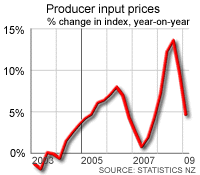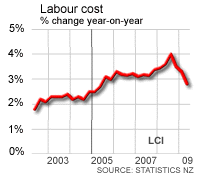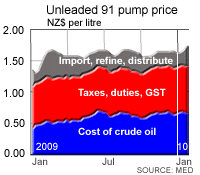Opinion: Why a 50 bps OCR cut would be a mistake
3rd Sep 08, 3:20pm
by
 Next Thursday the Reserve Bank of New Zealand is likely to cut the Official Cash Rate from its current 8%. The big question though is how big the cut will be.
Up until a couple of weeks ago some economists and market players thought a 50 basis point cut was a strong possibility.
They pointed to the unambiguous comment in the Reserve Bank's July 24 statement that seemed so clear as to be almost a promise.
Next Thursday the Reserve Bank of New Zealand is likely to cut the Official Cash Rate from its current 8%. The big question though is how big the cut will be.
Up until a couple of weeks ago some economists and market players thought a 50 basis point cut was a strong possibility.
They pointed to the unambiguous comment in the Reserve Bank's July 24 statement that seemed so clear as to be almost a promise.
"Provided that the outlook for inflation continues to improve and there is no excessive exchange rate depreciation, we would expect to lower the OCR further."
 The lack of ambiguity and the various hints and suggestions in the press conference from Governor Alan Bollard and a subsequent radio appearance led many to believe that rate cuts, and possibly big ones, were on the cards for September 11, October 23 and December 4.
So let's test the Reserve Bank's own caveats for a rate cut.
Has the outlook for inflation continued to improve?
Consumer price inflation hit 4% in the June quarter and is headed for 5% in the September quarter. Producer Price inflation in the June quarter went through the roof. Inputs price inflation hit an annual rate of 11.8% and the quarterly inflation of 5.8% was the highest since March 1980. Outputs inflation was 3.5% for the June quarter and 8.5% for the year, which was the highest since September 1987.
The lack of ambiguity and the various hints and suggestions in the press conference from Governor Alan Bollard and a subsequent radio appearance led many to believe that rate cuts, and possibly big ones, were on the cards for September 11, October 23 and December 4.
So let's test the Reserve Bank's own caveats for a rate cut.
Has the outlook for inflation continued to improve?
Consumer price inflation hit 4% in the June quarter and is headed for 5% in the September quarter. Producer Price inflation in the June quarter went through the roof. Inputs price inflation hit an annual rate of 11.8% and the quarterly inflation of 5.8% was the highest since March 1980. Outputs inflation was 3.5% for the June quarter and 8.5% for the year, which was the highest since September 1987.
 The Reserve Bank's own survey of business leaders' inflation expectations found the average expectation for CPI inflation two years out rose to 3% from 2.9%, right at the top of the Reserve Bank's 1-3% target band. The median expectation was unchanged at 3%. The National Bank's Business Outlook survey found inflation expectations sitting at 3.79%, up from 3.67% the previous quarter.
Inflation is not dead by any measure. Wage inflation is sitting at a record high of 3.5%.
Yet there are signs of improvement. The oil price has dropped from close to US$150 a barrel to under US$110 barrel since the beginning of last month. Other commodity and food prices are dropping too, including dairy prices.
Inflation pressures will also flow through from the slide in the New Zealand dollar.
The Reserve Bank's own survey of business leaders' inflation expectations found the average expectation for CPI inflation two years out rose to 3% from 2.9%, right at the top of the Reserve Bank's 1-3% target band. The median expectation was unchanged at 3%. The National Bank's Business Outlook survey found inflation expectations sitting at 3.79%, up from 3.67% the previous quarter.
Inflation is not dead by any measure. Wage inflation is sitting at a record high of 3.5%.
Yet there are signs of improvement. The oil price has dropped from close to US$150 a barrel to under US$110 barrel since the beginning of last month. Other commodity and food prices are dropping too, including dairy prices.
Inflation pressures will also flow through from the slide in the New Zealand dollar.
 This is the second caveat in the Reserve Bank's outlook for lower rates.
Has there been an excessive exchange rate depreciation? The answers are yes and no. The New Zealand dollar has fallen 11% against the US dollar over the last six weeks.
Yet it has only fallen 3.5% on a trade weighted basis (TWI) over the same period because of a sharp bounce in the New Zealand dollar against the currency of our largest trading partner, Australia. That's because sentiment shifted from rate hike expectations there to expectations (now met) of a rate cut.
The Reserve Bank will rightly point to the TWI as a sign that the currency has not depreciated excessively. It could also point to the lower oil price and slowing developing economies (in particular China) as a sign that inflationary pressures might be ebbing from the system.
But it is not out of the woods yet on the inflation front.
This is the second caveat in the Reserve Bank's outlook for lower rates.
Has there been an excessive exchange rate depreciation? The answers are yes and no. The New Zealand dollar has fallen 11% against the US dollar over the last six weeks.
Yet it has only fallen 3.5% on a trade weighted basis (TWI) over the same period because of a sharp bounce in the New Zealand dollar against the currency of our largest trading partner, Australia. That's because sentiment shifted from rate hike expectations there to expectations (now met) of a rate cut.
The Reserve Bank will rightly point to the TWI as a sign that the currency has not depreciated excessively. It could also point to the lower oil price and slowing developing economies (in particular China) as a sign that inflationary pressures might be ebbing from the system.
But it is not out of the woods yet on the inflation front.
 The other interesting force for the Reserve Bank not to have to cut interest rates too aggresively next Thursday is the economy itself. It is still clearly in recession, but there are shoots of life emerging. The New Zealand dollar's fall is helping fire up the export sector and lower interest rates since late July are encouraging consumers and home buyers to stick their head out into the open. Consumer and business confidence is rebounding.
Does the Reserve Bank really need to cut interest rates sharply? The economy is beginning to get there by itself.
A 50 basis point cut would send the wrong signals to price and wage setters who are riding very close to the yellow lines. A 25 basis point cut would be consistent with the Reserve Bank's earlier indications and not scare the horses too much.
Therefore our bet is for a 25 basis point cut on Thursday, not the 50 basis points some might have expected a few weeks ago.
The other interesting force for the Reserve Bank not to have to cut interest rates too aggresively next Thursday is the economy itself. It is still clearly in recession, but there are shoots of life emerging. The New Zealand dollar's fall is helping fire up the export sector and lower interest rates since late July are encouraging consumers and home buyers to stick their head out into the open. Consumer and business confidence is rebounding.
Does the Reserve Bank really need to cut interest rates sharply? The economy is beginning to get there by itself.
A 50 basis point cut would send the wrong signals to price and wage setters who are riding very close to the yellow lines. A 25 basis point cut would be consistent with the Reserve Bank's earlier indications and not scare the horses too much.
Therefore our bet is for a 25 basis point cut on Thursday, not the 50 basis points some might have expected a few weeks ago.

We welcome your comments below. If you are not already registered, please register to comment
Remember we welcome robust, respectful and insightful debate. We don't welcome abusive or defamatory comments and will de-register those repeatedly making such comments. Our current comment policy is here.